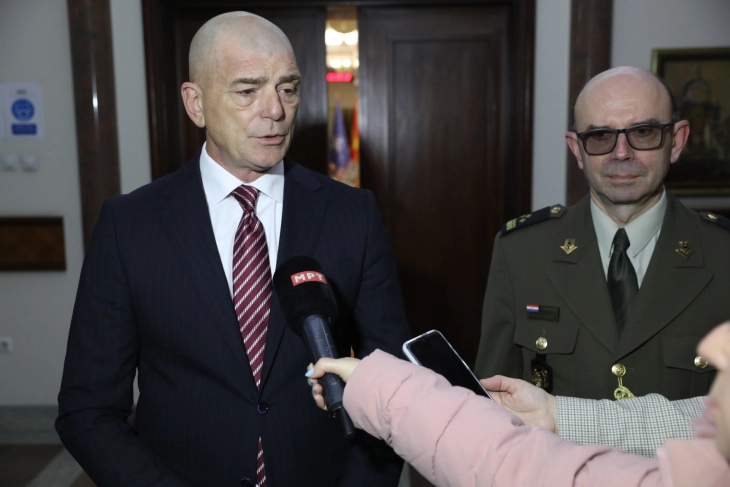Arsoski: Peace and stability achieved through investment in defence capabilities
- The defence of Macedonia within NATO is more necessary than ever, and the public must understand that peace and stability are achieved through investment in defence capabilities, said MP and former Major General Pavle Arsoski.

Skopje, 19 February 2025 (MIA) – The defence of Macedonia within NATO is more necessary than ever, and the public must understand that peace and stability are achieved through investment in defence capabilities, said MP and former Major General Pavle Arsoski.
As head of the Parliamentary Committee on Defence and Security, Arsoski, who hosted on Wednesday the Association of Defence Attachés accredited in the Republic of North Macedonia, said that the country has always been committed to fulfilling its NATO membership obligations, including the NATO Summit’s 2014 Wales guidelines for allocating at least 2% of the defence budget.
“We reached this goal shortly after joining NATO in 2020. By 2023 and 2024, our defence spending had already exceeded 2% of GDP. NATO is now discussing higher percentage – 3% and event 5% - but what is important is how funds are allocated and utilized within the defence system. The public should also be aware that peace and stability require investment in defence capabilities. If you want peace, prepare for war, this reflects our serious commitment to NATO obligations. Our Minister of Defence has mentioned that we may strive to reach a significant percentage of 3% but beyond that, I believe Macedonia is not currently in a position to allocate more,” Arsoski said in response to journalist’s question about US President Donald Trump’s initiative for NATO allies to spend 5% of GDP annually on defence.

The Croatian Defence Attaché, Colonel Stjepan Domjančić, stated that Croatia has been continuously increasing its defence budget spending since the NATO Summit in Wales, maintaining a minimum of 2% of GDP. However, he stressed that raising public awareness about the importance of defence and security is even more crucial for the future.
“We have surpassed the 2% of GDP threshold, but more important than the number itself is how these funds are allocated, their quality and purpose. It is essential to shift public awareness, not only among defence personnel but also among citizens, so that defence and security receive greater attention in the future. At the same time, we must ensure that increased defence spending does not negatively impact other sectors of society, as that could ultimately undermine funding for defence itself,” he said.
Referring on military and overall defence cooperation between Croatia and North Macedonia as NATO allies, he assessed that it is highly developed, with a primary focus on education, training, and expert collaboration. There is strong cooperation between military educational institutions - the Military Academy in Skopje and the Croatian Defence and Security University. However, he believes there is significant potential for expanding cooperation in the future, especially in these challenging security times.

As part of today’s visit by the Association of Defence Attachés accredited in the Republic of North Macedonia, invited by the Parliamentary Committee on Defence and Security, Committee head Arsoski stated that the discussions would focus on defence cooperation with the Macedonian Ministry of Defence. Moreover, current NATO and EU-related topics will be discussed, including efforts for ceasefire in Ukraine and Europe’s security.
“During the open discussion, we will bring up various topics and see how the conversation unfolds. However, there is definitely significant room for cooperation in the field of defence. The issues at hand are highly relevant and, at times, quite dramatic these days. That is why Macedonia's defence within NATO is more necessary and important than ever, and it is crucial to have these discussions,” Arsoski said.

Domjančić, on the other hand, expressed satisfaction that, unlike previous activities of the Association, which have primarily focused on visits to the organizational units of the Ministry and the Army of North Macedonia, this is the first time they have had the opportunity to view the country’s defence sector from the perspective of defence policy frameworks and parliamentary oversight of budgeting.
The Association of Defence Attachés includes countries from the EU, NATO, and third countries, but he emphasized that their activities and visits do not feature discordant tones, as the security crises existing in the world are a globally present and shared issue.

“Certainly, as NATO and EU members, we may have a different perspective, but the fears and hopes for a better world are something that unites us all. This is a great opportunity to listen to those with whom we disagree,” Domjančić said.
Photo: MIA







